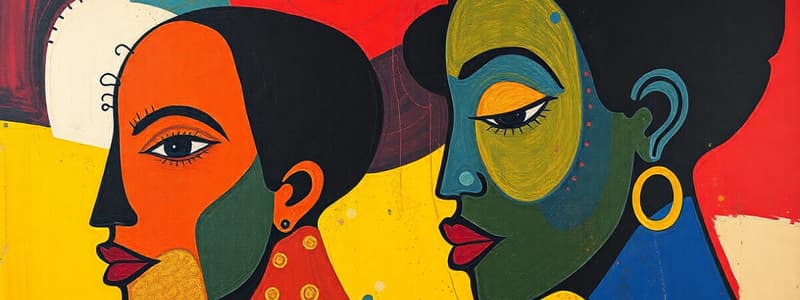Podcast
Questions and Answers
How did colonial history and education systems primarily contribute to the formation of African identity?
How did colonial history and education systems primarily contribute to the formation of African identity?
- By promoting economic equality across different regions.
- By creating a uniform educational curriculum.
- By reinforcing traditional African governance structures.
- By introducing different languages and cultural values, leading to diverse experiences and identities. (correct)
How does Julius Nyerere's philosophy relate to the concept of African communal identity?
How does Julius Nyerere's philosophy relate to the concept of African communal identity?
- By stressing togetherness and oneness within African cultures. (correct)
- By advocating for a return to pre-colonial political systems.
- By promoting the adoption of Western philosophical ideals.
- By emphasizing the importance of individual achievement over collective progress.
In what way did policies of assimilation impact African identity during the colonial era?
In what way did policies of assimilation impact African identity during the colonial era?
- By completely eradicating indigenous African cultures and languages.
- By encouraging Africans to adopt the culture, language, and customs of the colonizers, often marginalizing their own heritage. (correct)
- By creating a sense of unity between colonizers and the colonized.
- By promoting the preservation of African traditions and customs.
How does the concept of 'I am because we are' reflect a core tenet of African philosophy?
How does the concept of 'I am because we are' reflect a core tenet of African philosophy?
How does Western thought contrast with African thought from a philosophical standpoint?
How does Western thought contrast with African thought from a philosophical standpoint?
Flashcards
Negritude Movement
Negritude Movement
A cultural and literary movement among French-speaking African and Caribbean intellectuals in the 1930s.
Anglophone vs Francophone
Anglophone vs Francophone
Differences in colonial history, education, and political policies influencing African identity.
Senghor
Senghor
Key figure who emphasized empathy and the differences between Western and African thought.
Colonial Influences
Colonial Influences
Signup and view all the flashcards
I am because we are
I am because we are
Signup and view all the flashcards
Study Notes
Negritude Movement
- A cultural and intellectual movement
- Began in the 1930s among French-speaking African and Caribbean intellectuals focused on African identity
- Sought to challenge Western colonialism and racism and promote African identity
- Emphasized the importance of emotions, intuition, and collective identity in African cultures, contrasting with Western rationalism.
Key Differences Between Western and African Philosophies
- Western philosophy emphasizes reason, logic, and individualism (rooted in Greek thought)
- African cultures emphasize emotions, intuition, and communal identity
Colonial History and Education in Africa
- Many African countries experienced colonization by European powers (like Britain)
- Colonial rule influenced educational systems, often prioritizing European languages and cultural norms
African Leaders and Nationalism
- Leaders like Julius Nyerere of Tanzania and Kenneth Kaunda of Zambia were prominent nationalists and philosophers in post-colonial Africa
- They advocated for African values and unity
Studying That Suits You
Use AI to generate personalized quizzes and flashcards to suit your learning preferences.




